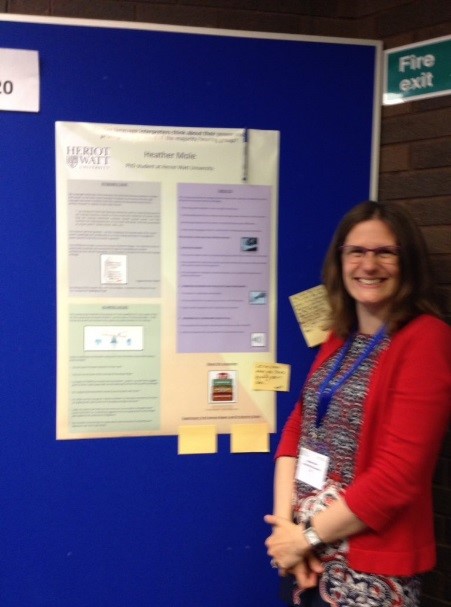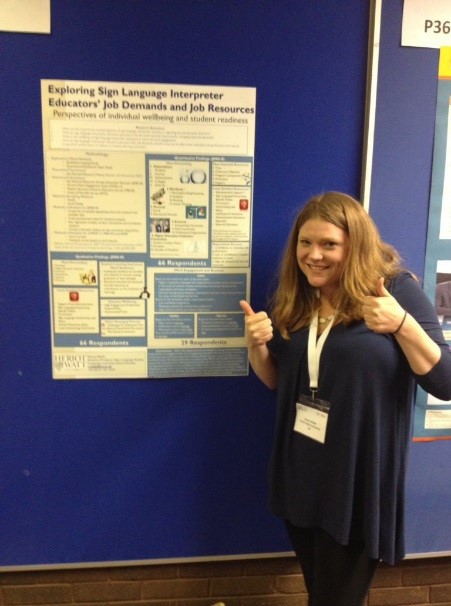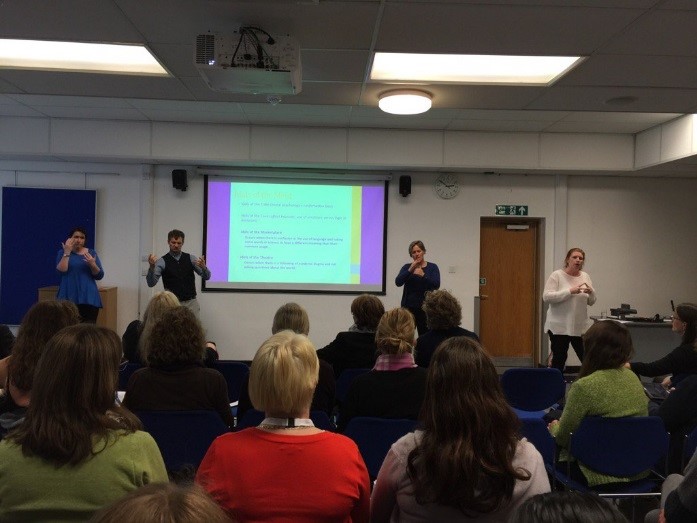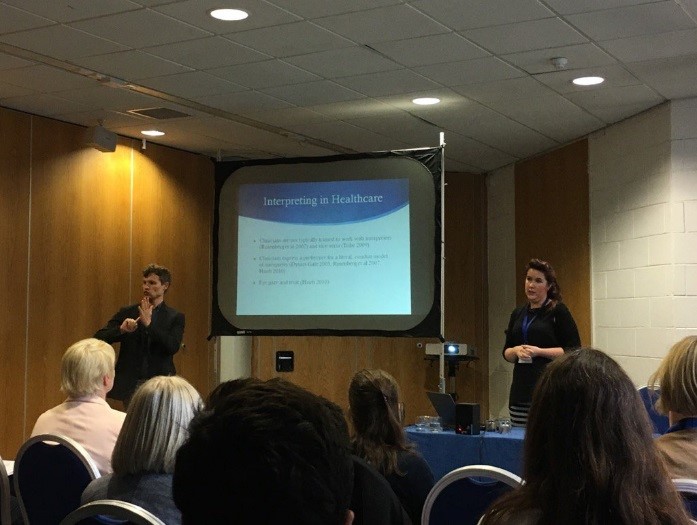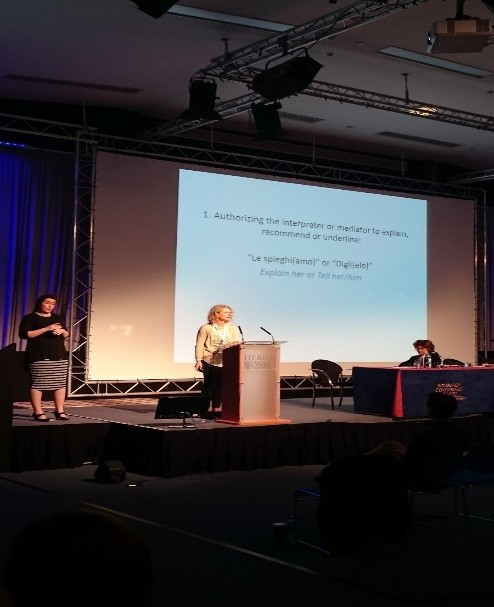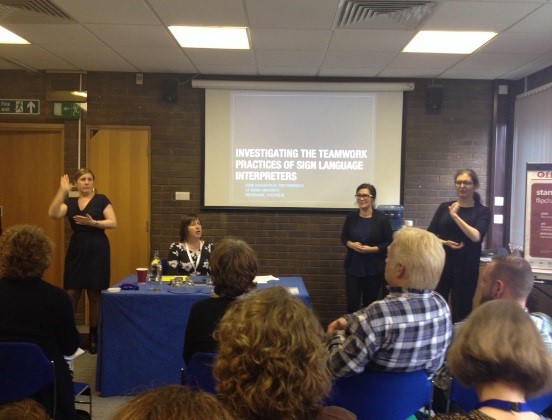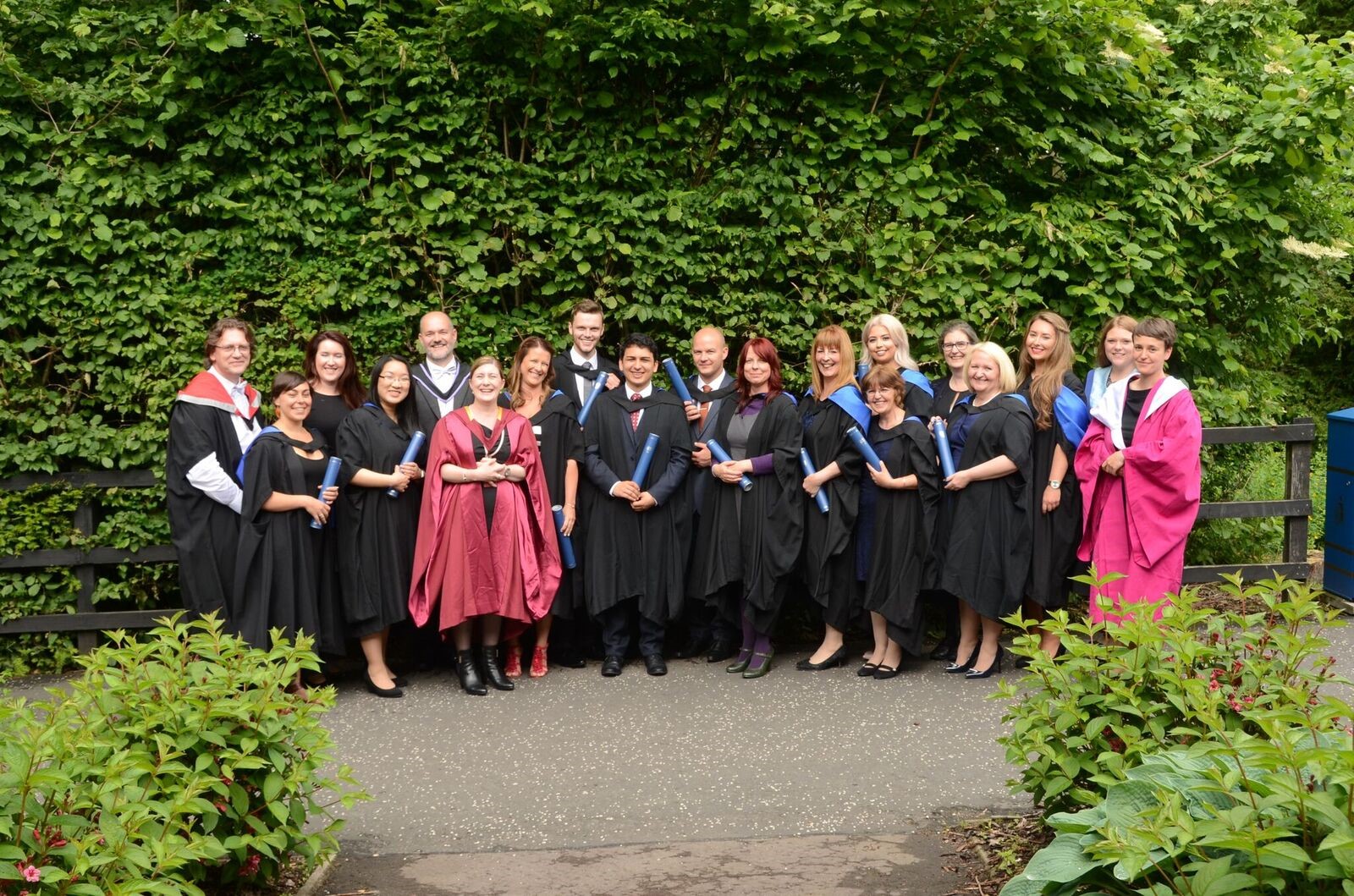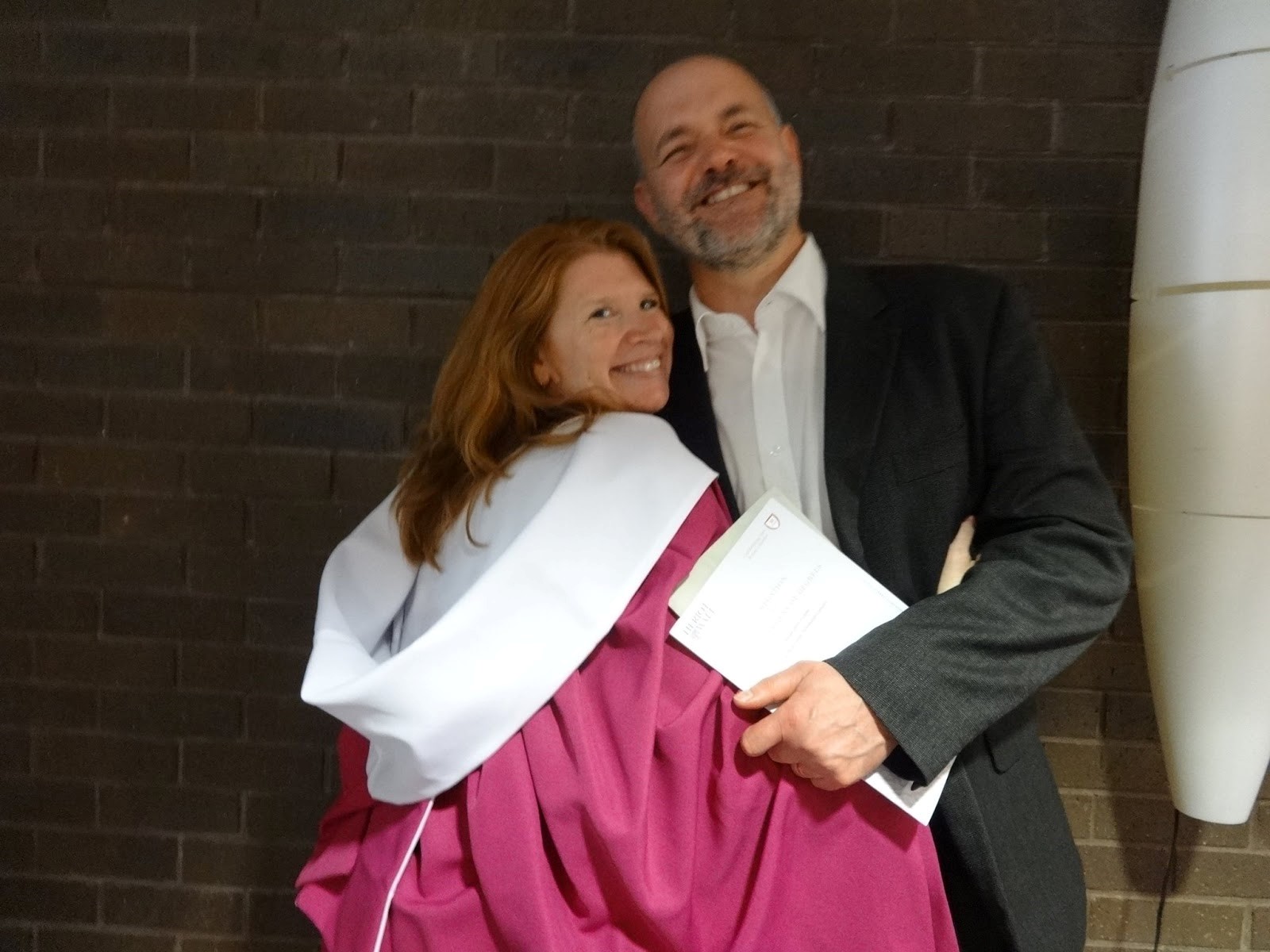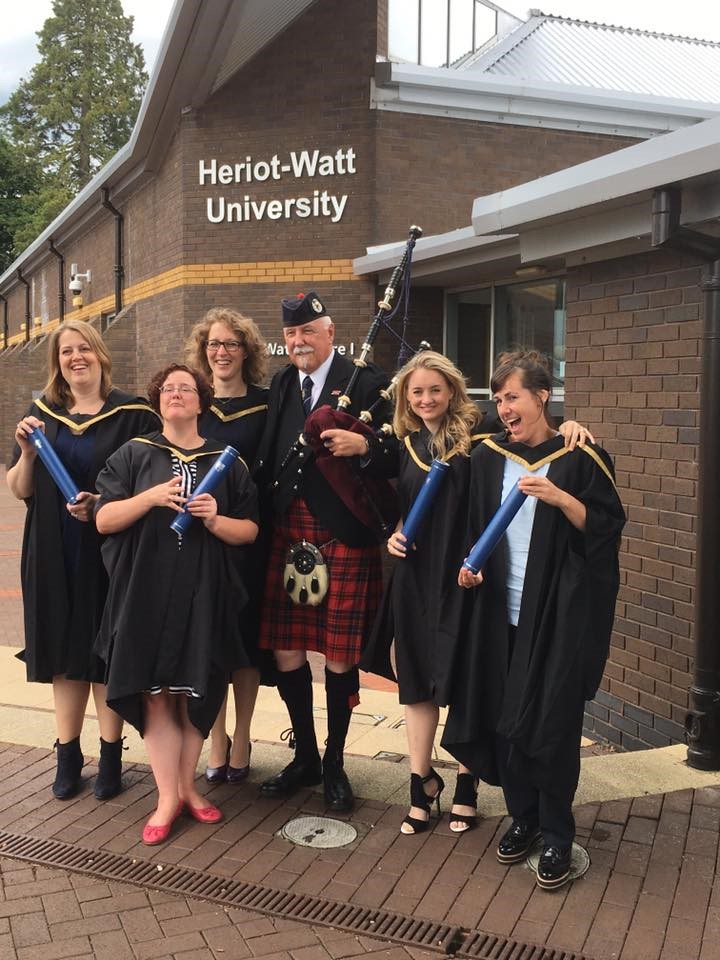DESIGNS project: Promoting access to Employment for deaf people
By Audrey Cameron & Jemina Napier
See link to this blogpost in British Sign Language (BSL) in two parts:
Part 1: https://youtu.be/KSyoDXXICh8
Part 2: https://youtu.be/p0GM0H3hrWI

This blogpost is published to coincide with the publication of the DESIGNS research project report. This presentation was originally planned to be delivered at the Bridging the Gap 6 conference in Cardiff in November 2019, but due to technical issues with trying to live stream it could not happen. So instead we filmed our presentation and have created this blogpost to provide an English text equivalent. The goal of the Bridging the Gap conference series is to ensure that research taking place in academia is made available to the British Deaf community, and also that deaf BSL users can shape the research agenda. The 2017 Bridging the Gap conference was hosted at Heriot Watt University, so we hope that by making this blogpost it will some way make up for not being able to present at the 2019 conference.

Both of us work at Heriot-Watt University in the SIGNS@HWU team, which is affiliated to the Centre for Translation & Interpreting Studies in Scotland (CTISS), and we were the UK team in the Designs Project from 2017-2019. The project is now finished, and the aim of this blogpost is to provide a conclusion to our work by presenting our key findings and also to provide information about the resources that have been developed through the life span of the project that specifically pertain to the UK context. In the videos linked to this blogpost you will see a taste of the resources that we have created.
What was the DESIGNS Project?
The DESIGNS Project was about deaf people in employment and the key focus of the research was to examine how deaf people work best with interpreters in employment contexts, including getting a new job, continuing employment working alongside regular interpreters, and also how one’s career progresses and how one gains promotion in the work place.
Funding for the project came from ERASMUS+. The research delved into what it is like for deaf people and, importantly, for interpreters who work alongside deaf colleagues in employment settings, as well as finding out employers’ views about deaf people in the workplace. There were seven project partners working across four different countries, so we worked with partners in Ireland, Belgium and Germany, including the European Forum for Sign Language Interpreters (efsli) and the European Union of the Deaf (EUD).

The culmination of the project was a meeting at the European Parliament in April 2019 when we shared the findings and discussed implications at a concluding event hosted by the (then) deaf MEP Helga Stevens.

One of the key aims of the project was to develop resources and training materials, as well as guidelines to help interpreters, deaf employees and employers to understand best practice in the work place. The project team felt that it was important to have research as the foundation for our work so that the resources we developed had a solid evidence base and linked theory to practice.
DESIGNS project research phases
The research itself had four phases. In the first of those, the EUD conducted a survey via national deaf associations across Europe pertaining to numbers of deaf people in employment and numbers of those who are unemployed. The survey also asked questions about the payment and booking of interpreters as well as a number of other issues. In the second of the four phases, we conducted a global literature review in the area of deafness and employment. Thirdly, each of the universities involved in the project conducted either focus groups or individual interviews, which were either face to face or online. We asked questions of employers, deaf employees and interpreters to really understand how they felt about the barriers and challenges they face as well as positive stories from their employment experiences. We were keen to gather information about these positive experiences as the team’s goal was to produce best practice guidelines, rather than focussing on negative experiences and obstacles. In summary, the third and fourth phases were aimed at eliciting views from the three groups of stakeholders: deaf employees, employers and interpreters.
This blogpost focuses on the British data set and we will share with you our findings from the three stakeholder groups in the UK and show you some of the resources we have developed for use in the UK.
Research findings
We collected a wealth of data that we analysed for key themes and to identify gaps in existing knowledge.
We found that most people did not know what rights and what responsibilities they had and there were gaps in, firstly, organisational culture meaning the culture of the working environment and how it affects deaf employees. Secondly, we identified a gap in experience, thirdly a feedback gap and fourthly we identified systems gaps. An example of this being when deaf people finish school or university and attempt to transition into the workplace, many do not know how to find an interpreter, how to source funding to pay for support or how to work with hearing people. Many of our respondents went to deaf school and therefore struggled in an unfamiliar hearing environment. That is an organisational or cultural gap that we had not realised existed, as well as being a systems gap in terms of the lack of knowledge of where to find funding.
Also, most respondents reported feeling anxious about job interviews, again through lack of knowledge about how and when to source interpreters for the interview process. Further, they stated they lacked practice in interviews, interview techniques and how to work with interpreters in interview situations. The need for funding and where to find the funding was an identified gap. We would describe this situation as an experience and knowledge gap.
Many workplaces with multiple deaf employees make use of staff interpreters. Deaf respondents found this positive because it helps when the interpreters and deaf people are familiar with each other as this allows for smoother interpretation. Because the staff interpreters are familiar with the work place, it helps them to feel confident but a lot of people reported that they did not have access to regular interpreters and this creates a gap, as interpreters find it more difficult to interpret unfamiliar meetings, jargon and people’s names. Because of this difficulty, we identified that it is important for a regular pool of interpreters, familiar with the workplace, to be available.
This also helps interpreters to be more confident and competent in those work settings. There was a reported difficulty in finding the right interpreter because there are not enough interpreters and the demand exceeds the supply which sometimes resulted in respondents using Communication Support Workers (CSWs) not only due to the lack of interpreters but also because CSWs are cheaper for the company. So, not having enough interpreters is another gap.
Also, respondents commented on the importance of preparation so that interpreters know what to expect, as well as feedback to the interpreters from both hearing and deaf workers, which helps improve the standard of the interpretation and also encourages team work; the result being that deaf people are represented better. But many deaf respondents were nervous about giving feedback in case the interpreters took this negatively and then would not come back to work with them. This difficulty was expressed within the context of not having enough interpreters.
In relation to the UK Government’s ‘Access to Work’ scheme, many of our deaf participants reported that when starting a new job, they were unaware of how to apply, fill out the forms, etc., which led to delays of up to three or four months meaning it was difficult for them to start a new job without interpreting support. So, there is a need to change that situation and ensure immediate support is available because without such, hearing colleagues could misunderstand and get the wrong impression of their new deaf colleague.
Once in employment, a lot of our deaf respondents reported a lack of confidence in applying for promotion. This phenomenon could be linked to there not being enough interpreters or lack of available training. Deaf employees undertaking training have the additional burden of interpreter costs and questions remain over who will pay for interpreting services. For these reasons, it is more difficult for deaf employees to seek and gain promotion. Furthermore, not being able to hear means that they also miss out on office chat and gossip which may include informal information about pending available promotions. So, that’s another gap.
Also, hearing people are generally not familiar about how to work with deaf sign language users, so they experience anxiety and hesitation about how to relate to their deaf colleagues. These issues could be cross-cultural or due to misunderstandings and communication breakdowns. Thus, there is a need for training to be provided to non-deaf, or rather, non-signing personnel. The necessity of such training highlights the importance of the DESIGNS project.
The themes and gaps were identified as a pattern across three different countries: Germany, Ireland and the UK. We found a similar picture in each country so these issues are not only specific to the UK. They are widespread and similar in other countries too. What we have done here is used examples, such as Access to Work, that are specific to the UK to discuss the issues in relation to this country.
Project outputs
Training materials
Training materials were developed in parallel across the different countries. So, we’ve developed specific resources in BSL. We have videos and also a training course that all stakeholders could undertake together. There’s an e-guide presented in sign language for deaf community members and we have versions of this in BSL, Irish Sign Language (ISL) and German Sign Language (DGS). We have a written guide for employers and all of these materials are available through the Designs website.
We have now finished the project and most of the resources are now available through the website with everything we have learned. We would like to share some sample clips of materials and resources we’ve developed throughout the project.
The first videos focus on job interviews and show what it’s like when deaf people go for interviews with an interpreter to try to get a job. The videos can be used in training for all three stakeholder groups: employers, deaf employees and interpreters.

In the Job Interview: Scenario 1 video, the interpreter was booked at the last minute, being contacted on the morning of an interview due to take place that afternoon, meaning that neither of the deaf interviewee or interpreter were prepared; they did not have the opportunity to meet beforehand and neither really knew what was involved.

In the Job Interview: Scenario 2 video, we see what happens when there is preparation; both the deaf interviewee and interpreter preparing beforehand and discussing the interview.
We have used these two videos in the training that we did with hearing, non-signing employers from a range of different organisations. We showed them the video without subtitles, so they had to watch and listen to the interpreter’s spoken English interpretation of the deaf interviewee’s signed utterances. They could obviously access the interviewers’ speech as well. After showing them both videos, we ask them to contrast the two. When we asked the employers what they thought about the deaf candidate in the first video, they responded that they would not have given her the job as she did not sound confident and was hesitant. With regards to the second video, they reported that they would have given her the job.
It was only afterwards that we told them that the candidate’s signing was exactly the same in both videos, and the hesitation actually came from the interpreter in the first video due to lack of preparation. The employers were dumfounded by the difference the interpreter made in their perception of the deaf interviewee, which made them aware of this issue. From this example we can see how important it is for interpreters to be prepared, to know the person well and generally be ready to interpret for a job interview. It is unfair for deaf candidates if the interpreter is unsure about who is present, information about the company and so on.
We have also shown the same two videos in a masterclass that we held in Edinburgh in collaboration with Deaf Action, where we had three groups representing deaf people, employers and interpreters. We showed them the same two videos and followed exactly the same procedure and got a similar reaction from all three groups. It had an impact on all of them, for example the deaf participants fully appreciated how working with an unprepared interpreter could seriously damage their job prospects at interview and for the interpreters, the experience also underscored the importance of preparation. All three groups realised how important an issue preparation is.
Case studies
An important outcome of the project was to show different positive deaf role models in employment; success stories of those whose careers have gone well. So, we filmed various case studies of deaf people to share their experiences of how they have succeeded at work, including Toby Burton, who works in the finance industry.

We just picked one short clip from Toby’s video, as an example of a positive story that shows a deaf person being successful in his work and attaining a high-level position in industry. By showing what deaf people can do, the goal is particularly to encourage young deaf people by showing them what is possible through a variety of role models from a diverse range of backgrounds and in very different jobs, some working in deaf or sign language focused work and others not.
We also collected various case studies from a number of people across the three stakeholder groups of deaf people, interpreters and employers, in order to showcase good practice and give insights into experiences in deaf employment.
Our research showed that there did not seem to be enough visible deaf role models to show others how to succeed, as well as a lack of mentors, so it is even more important to have videos like these available.
Training course

The course curriculum contains a number of different modules, which are grouped to focus on the training needs of each of the three stakeholder groups. For the deaf participants, we focussed on their employment rights, such as interpreter provision as well as how to best work with an interpreter; and for the interpreter group, we gave similar information about how to build rapport with both the deaf candidate and the employers thereby creating a triadic relationship. For the employers’ group, we gave information about deaf people and their rights but also how to include them as employees in the workplace, dispelling any fears they may have and so on. So, the content of these modules can be made available to other institutions, such as universities or training centres and the videos and other training materials make up a whole package that can also be used for CPD workshops. In essence, these modules are available to pick and mix according to need and are freely available for anybody to use.
This is particularly useful for a deaf person starting a new job as they can select some of the materials to help their colleagues understand how best to work with them.

Example Session 4 is one example of one module content about what happens when deaf people graduate from college or university and how they then navigate the world of employment, including learning outcomes that link to videos and in this example, the video is a person from Ireland giving advice to deaf jobseekers.
Other materials
Other materials have been designed specifically for deaf communities in the form of a tailored E-Guide each for the UK, Ireland and Germany, which is like written guidelines but presented in the national sign language, in our case BSL, and give ten tips for deaf sign language users on getting a job. These videos will be useful for young deaf people because they are delivered in sign language.

We also produced a guide for employers, which comes in the form of a small booklet and it is aimed at employers who are preparing to bring a deaf employee into their workplace. It contains useful information gathered through our research from employers who told us what they needed to know.

The employer guide has been sent out to employers that were involved in the project so they can share it with others, and is available to download from the project website, so please feel free to disseminate it as widely as possible. We want to enable deaf people to have as smooth a transition into employment as possible.
Acknowledgements
The team owes a great deal of thanks to our project partners here in the UK. We could not have achieved all we did without strategic partnerships with different organisations, including the British Deaf Association, the Deaf Business Academy, the Association of Sign Language Interpreters UK, Deaf Scotland, Deaf Action, the Government Department of Work and Pensions, Alison Bryan at Deaf UK Jobs, Tony Barlow at Deaf2Work, as well as the former Scottish Association of Sign Language Interpreters; and VERCIDA, which is a platform for supporting employers who are interested in employing people with disabilities thereby increasing in diversity in the workplace. We were fortunate to work in partnership with VERCIDA as they gave us access to their sizable network of employers and can facilitate the dissemination of the training materials to employers.

Also involved in an advisory capacity were Action on Hearing Loss’ Employment Service in Scotland and Deaf Plus in London. The Centre for Public Innovation and the research centre on Deafness, Cognition & Language (DCAL) at University College London provided us with rooms to use for interviews and focus groups in London.
We would like to extend our thanks to all the organisations involved across the UK that helped us deliver this project.
Finally, we could not have done carries out this project without the involvement of our deaf, employer and interpreter participants, so thank you to you all.
Please visit the Designs Project website to access the resources.




















